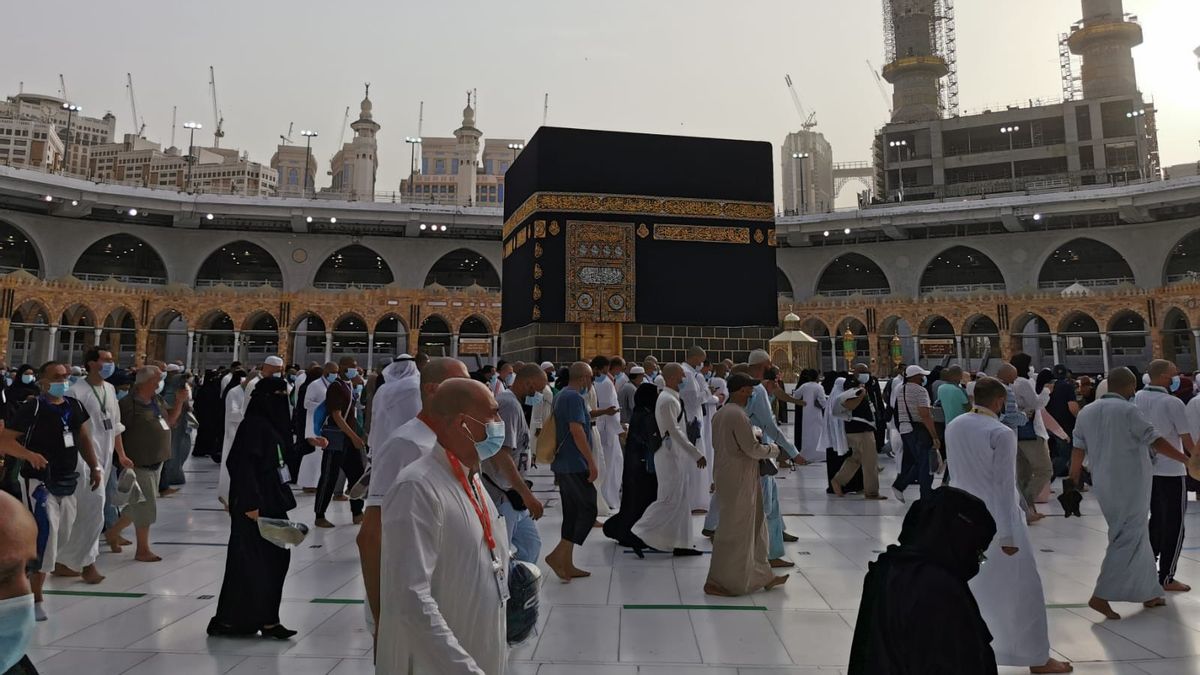JAKARTA - Worshipers dressed in white Ihram from around the world have thronged the streets of Mecca, Saudi Arabia, as Islam's holiest city prepares to host the largest hajj pilgrimage since the coronavirus pandemic.
Banners welcoming devotees, including the first international visitors since 2019, adorned squares and alleys, while armed security forces patrolled the ancient city, the birthplace of the Prophet Muhammad.
"This is pure happiness," Sudanese pilgrim Abdel Qader Kheder told AFP in Mecca, ahead of the event which is expected to start on July 6.
"I can hardly believe I'm here. I'm enjoying every moment," he said.
One million people, including 850,000 from abroad, were allowed to perform the Hajj this year, after two years of drastically reduced numbers due to the pandemic.
At least 650,000 overseas pilgrims have arrived so far in Saudi Arabia, authorities said on Sunday.
In 2019, some 2.5 million people took part in worship, which included circling the Kaaba, the majestic 'black cube' of the Grand Mosque, gathering on Mount Arafah and 'stoning the devil' in Mina.

The following year, foreigners were banned and pilgrims limited to just 10,000, increasing to 60,000 Saudi citizens and residents fully vaccinated by 2021, to stop the haj from turning into a global super-spreader.
One million vaccinated pilgrims under the age of 65 will attend Hajj under strict sanitary conditions, with the Grand Mosque, the holiest site in Islam, cleaned and disinfected 10 times a day.
Days after the haj, Prince Mohammed will welcome US President Joe Biden who, with oil prices soaring due to Russia's invasion of Ukraine, has reneged on promises to turn Saudi Arabia into a 'pariah' over the 2018 murder of journalist Jamal Khashoggi by Saudi agents.
Saudi Arabia, which under recent reforms allowed raves in Riyadh and mixed beaches in Jeddah, now allows women to attend Hajj unaccompanied by a male relative, a requirement that was scrapped last year.
Masks are no longer mandatory in most enclosed spaces in Saudi Arabia but will become mandatory at the Grand Mosque. Pilgrims from abroad must submit a negative PCR test result.
The Grand Mosque will be "washed 10 times a day by more than 4,000 male and female workers", with more than 130,000 liters of disinfectant used each time, authorities said.
Since the start of the pandemic, Saudi Arabia has recorded more than 795,000 cases of the coronavirus, 9,000 of them fatal, in a population of around 34 million.
Besides COVID-19, another challenge is the scorching sun in one of the driest and warmest regions in the world, which is becoming increasingly extreme due to the impact of climate change.
Even though summer has just begun, temperatures are already hitting 50 degrees Celsius in parts of Saudi Arabia.
But for Iraqi pilgrim Ahmed Abdul-Hassan al-Fatlawi, hot weather is the last thing he thinks about while in Mecca.
"I'm 60 years old, so it's natural that I'm physically tired from the heat, but I'm calm, and that's the most important thing for me," she told AFP.
The English, Chinese, Japanese, Arabic, and French versions are automatically generated by the AI. So there may still be inaccuracies in translating, please always see Indonesian as our main language. (system supported by DigitalSiber.id)










